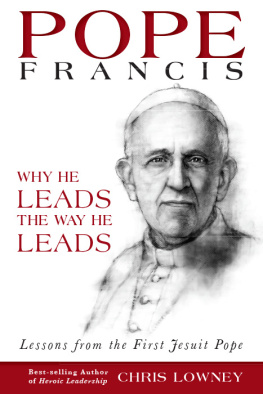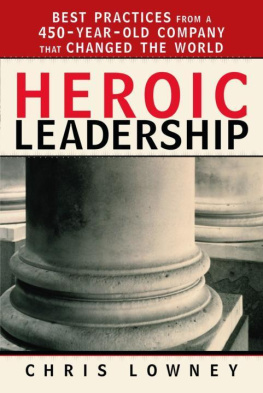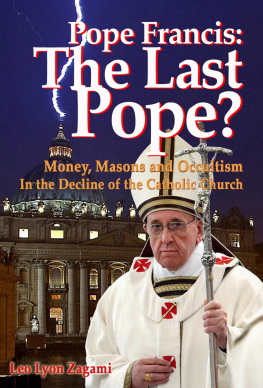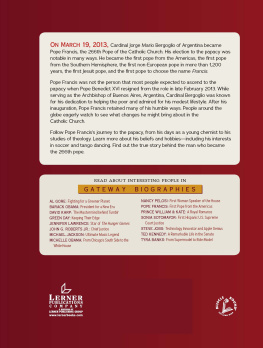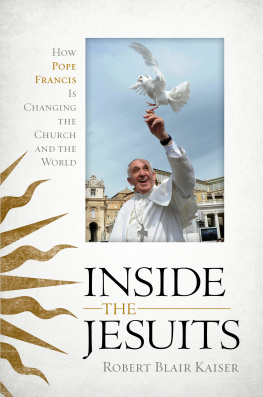Todays world stands in great need of witnesses, not so much of teachers but rather of witnesses. Its not so much about speaking, but rather speaking with our whole lives.
Pope Francis, Address from St. Peters Square, May 18, 2013
There is no leadership training program for popes-to-be. Nor did some Vatican functionary hand Cardinal Jorge Mario Bergoglio the New Pope Handbook or Pontificate for Dummies as soon as white smoke started pumping into the Vatican sky to announce his pontificate as Pope Francis. Instead, as best we outsiders know, fellow cardinals applauded his election, vested him in white, gave him some prayerful privacy to recollect himself, then pushed (well, escorted) him onto the loggia of St. Peters Basilica to assume leadership of 1.2 billion Catholics.
His actions immediately after were approvingly called unprecedented and shocking by the editor of LOsservatore Romano, the semiofficial Vatican newspaper;
Where did he learn to lead like this? Where does his vision come from? And what might the rest of us learn from him? Thats what this book is about.
What Prepares Anyone to Lead Well?
After all, like the pope, we sometimes find ourselves thrust onto that metaphorical balcony: step up, its time to lead this department, your family, this classroom, or, as the case may be, the whole Catholic Church.
Some folks approach such opportunities knowing that they are superbly prepared to lead, and that unshakable self-confidence stays with them every day of their careers. We call such people narcissists. They often get their organizations into trouble because, blinded by the radiant glow of their self-perceived greatness, they dont see what havoc they create or what misery they inflict on others.
Those of us with even a smidgen of self-awareness, on the other hand, quickly realize that no one fully trained us for the leadership challenges we inherit. Early in my own career at J. P. Morgan, I was trained to dissect corporate balance sheets and could ferret out companies that dared boost earnings by liquidating LIFO layers; I learned how to persuade corporate clients to save a few basis points by using our proprietary Eurobond structures instead of floating bonds in the United States.
Im not sure I ever used either skill, and Ive long forgotten how to do those technical stunts. After a few years at Morgan, I found myself as one of the managing directors in our Tokyo office, and in subsequent postings in Singapore, London, or New York, I never met a problem where liquidating LIFO layers was handy knowledge. And I quickly discovered that in the grown-up world, most problems dont have the same black-and-white answers as those pat bond-analysis equations.
Instead, I had to help the company figure out how to manage a large downsizing in the London office or how to motivate an unhappy subordinate. Now, some years after leaving Morgan and serving as board chair of one of Americas largest health care and hospital systems, I have to offer modest advice and oversight as our superb management team navigates a rapidly changing health care landscapeshifting laws, new technology, ethical dilemmas, and a dozen other equally complicated challenges.
The skills I have most needed were not the narrow technical ones, but broader, all-encompassing ones, like making complicated decisions when the facts and my values collide; managing my priorities when fifteen things must be done before lunch; knowing when to play decisions safe and when to take major risks; and, ultimately, figuring out what is most important in life.
We Are Hurting for True Leadership
The complicated questions came more often, the time frames grew shorter, the ethical dilemmas more complex, and no one ever sent me to a leadership school that taught how to deal with any of that. Instead, my leadership school has been my life. Whether I learned my lifes lessons well, my old Morgan colleagues and current health care colleagues would have to say. But I dearly hope that they would at least rate me better than average, because the average perception of leadership in America is truly awful. One major survey not long ago asked Americans whether they had a great deal of confidence in their leaders in politics, religion, business, or education. The answers? No, no, no, no. In not one of those four groups, considered bastions of our society, do Americans feel even moderate confidence.
Granted, leaders nowadays have incredibly difficult jobs. They often are under-resourced, work under enormous time pressure, cope with frequent change, feel the glare of near-constant scrutiny and high expectations, and must motivate coworkers and stakeholders who often are skeptical of authority. These realities make it incredibly hard to lead.
But our disappointmentand frequently our downright disgustwith so many of our leaders stems from more profound factors than the roles sheer difficulty. Too often, those in leadership positions seem preoccupied only with their own status or income. They are unable to inspire or unite us; they are not imaginative enough to solve the seemingly intractable problems that plague us; they are afraid to make tough choices or even to level with us; and they are insufficiently courageous to lead us through challenge and drive change.
Bluntly put, something is broken. We need new ways of reimagining leadership and better ways of preparing ourselves and others to lead.
What Is Distinctive about a Jesuit Pope?
Enter Pope Francis, the Jesuit pope. The paradoxes begin right there. The Jesuits are a Catholic religious order of priests and brothers founded by Ignatius of Loyola and his companions in 1540. In the course of their improbable history, Jesuits cofounded one of the worlds largest cities (So Paulo, Brazil), helped develop the Vietnamese alphabet, and helped institute the Gregorian calendar now used worldwide. They are the worlds largest religious order that is fully integrated under one superior general; more than 17,000 Jesuits now labor in more than one hundred countries.
With that track record and global network, why is a Jesuit pope in any way paradoxical? Simply because the Jesuit founder detested overweening personal ambition. The Jesuit rule book, its Constitutions, decried excessive personal ambition as the mother of all evils in any community or congregation. Wow. Imagine if everyone in corporate America had to report ambitious colleagues. The sheer volume of reporting would allow no time to get any work done.
Ignatius wanted Jesuits to be humble because Jesus, their role model, was humble. But he also understood how ambition and political infighting can shred organizational morale (sound familiar, corporate colleagues?). So he was trying to rein in the human tendency to stroke ones ego by seeking status, power, and advancement.

